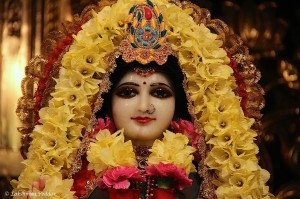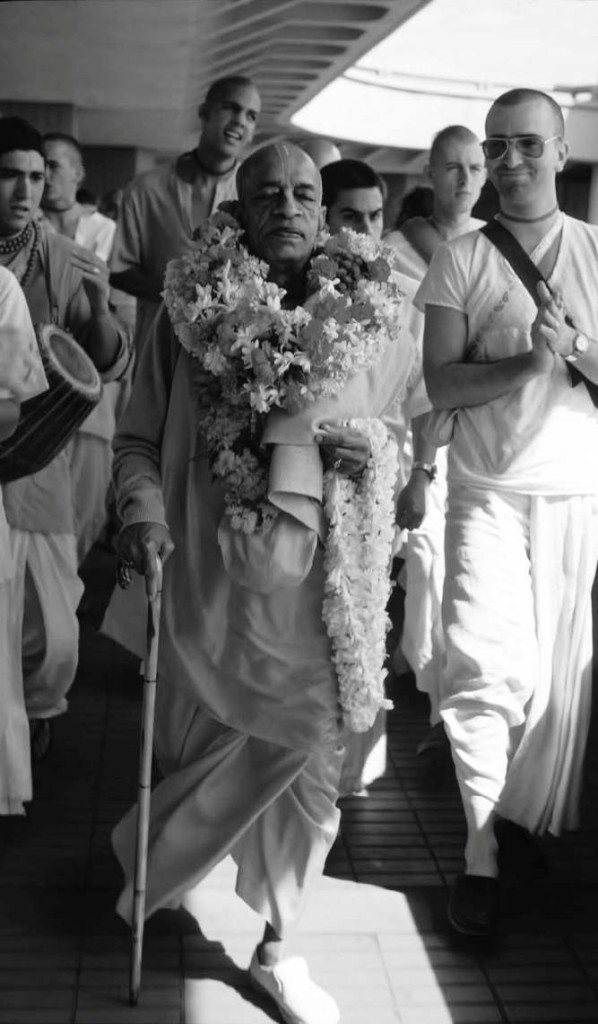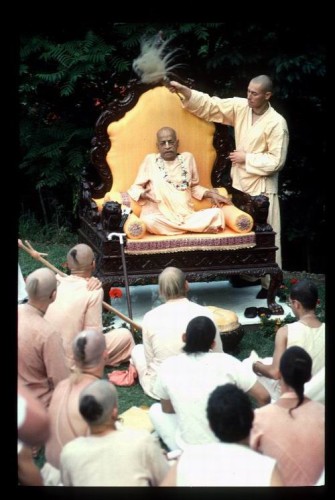Mangala Arati of Sri Sri Radha Gopinath, ISKCON Temple,Chowpatty,Mumbai;14th April. 2014
Mangala Arati of Sri Sri Radha Gopinath, ISKCON Temple,Chowpatty,Mumbai;14th April. 2014
New Vrindaban Daily darsan @ April 20, 2014.
→ New Vrindaban Brijabasi Spirit
I will not leave the company of the saintly devotees. I will not speak to my old friends and relatives. I will not even show my face to them. I am intent on residing in Vrinda?vana.
[Source : Nectarean Glories of Sri Vrindavana-dhama by Srila Prabodhananda Sarasvati Thakura, Sataka-2, Text-18, Translation.]
HH Rtadhvaja Swami / Bhagavad-gita As It Is 4.9
→ Kalachandji's Audio Archive
HH Jayapataka Swami Maharaj’s Vyasapuja
→ Kalachandji's Audio Archive
HG Mother Sucarya / CC Adi 17: The Pastimes of Lord Caitanya Mahaprabhu in His Youth
→ Kalachandji's Audio Archive
Close to our heart
→ KKSBlog
(Kadamba Kanana Swami, 03 October 2013, Melbourne, Australia, Srimad Bhagavatam 2.3.8)
 The universal form of the Supreme Lord is too big! Srila Prabhupada said, “How can you dress him? Where do you get all the cloth?” So, it is a problem but when there is Krsna, the most wonderful thing is that the Supreme Personality Godhead appears in a human like form and then becomes very accessible. He also acts in a human-like way. So his nature is close to our nature, and in that way, he is close to our heart.
The universal form of the Supreme Lord is too big! Srila Prabhupada said, “How can you dress him? Where do you get all the cloth?” So, it is a problem but when there is Krsna, the most wonderful thing is that the Supreme Personality Godhead appears in a human like form and then becomes very accessible. He also acts in a human-like way. So his nature is close to our nature, and in that way, he is close to our heart.
If God has a very different nature than we have the how can I understand him? How can I appreciate him? But because he is so close, we can develop that love and affection.
Vedic Discourse By His Grace Rohini Priya Dasa — April 20th, 2014
→ ISKCON Brampton
Alachua Workshop Part 6
→ Japa Group
Emails subscribers please click the big blue link above to see the video.
Saturday, April 19th, 2014
→ The Walking Monk
From Tent to Tent
I had paid a visit to the unsung heroes who are doing all the cooking outdoors for the hungry festival goers. It’s impressive! Just shy of the golden number 100, are these sizeable pots under fire that are burning and crackling away. Beryani, a South African favourite, is on the boil for this second day at the Chariot Festival which is held at the old Durban drive in theatre.
Food is one of the major features of festivals. Apart from the stage where our group brought down the house for the standing ovation performance of Little Big Ramayan, my like at the event is a tent called the Bhakti Cloud. Here the youth organize presentations of various sorts. On the program schedule, I’ve been dubbed as The Dance Master, so the expectation is for me to pull off a dance to the sound of half a dozen djembes.
So much for being The Walking Monk. Now there’s the expectation that I’m Fred Astaire. Anyways, our half hour stint went well. We got everyone up to dancing out and enacting the ten Avatars.
Another highlight for me was an hour session given to talking at Tent A, about walking experiences. I wasn’t sure that my Tails on Trails would carry an appeal, yet the tent filled up and interest in pilgrimage was generated. My final word was actually a question, “How many of you anticipate to do more walking now that you hear how fun and freeing it is?” The response was, “Lakker”, which in Afrikaans means, “Good”.
May the Source be with you!
5 KM
Friday, April 18th, 2014
→ The Walking Monk
Round and Around and Round We Go
The smart path for walking on the Chatsworth temple grounds is essentially a concrete walkway running as a concentric formation around the building. If you were to look from the bird’s eye view, you might see a spot on the rim of a wheel circling about over and over again. That spot would be a group of chanters moving constantly for at least an hour or more.
I am one of several in that group that makes the spot. Unofficially we have become by chance a japa team. Our group began as one. One became two. Two became three and so on.
Jabs from Pretoria joined us. He is a relative new comer to Krishna Consciousness and bhakti yoga. There are several paths leading to the temple which cross our walking path. Jabs happened to be walking on one of those paths, he spotted our group and I nodded that he should join our japa walking team. So I suggested to Jabs, which is short for Jambavan, “If you join us you just concentrate on the mantra, Hare Krishna Hare Krishna, Krishna Krishna Hare Hare, Hare Rama Hare Rama, Rama Rama Hare Hare . You’ll be happy to know that while chanting at this time, and you keep with our pace, you’ll be going at 5 kilometres an hour.” I implied to him that with chanting and walking simultaneously you get double mercy. Jabs was sold on the idea and he joined our group as it grew and grew. Everyone on board seemed to enjoy the power of joint chanting and joint walking. In addition to there being a moat around the temple with a constant flow of H2O that hugs the edifice, it creates a very pleasant atmosphere. It just so happens that Nelson Mandela had stepped and walked on our circular path more than once, giving our trail an extra significance.
Congratulations to Jabs and other members of our South African based drama troupe who pulled off a great rendition of Big Fish Little Fish on the first day of the great festival.
May the Source be with you!
8 KM
Thursday, April 17th, 2014
→ The Walking Monk
On Anger
SB 1.7.34
I was asked to give the class from Bhagavatam, SB 1.7.34. This I did after a brisk walk. Here are points we came up with on this interesting subject.
ANGER
1) A product of passion
2) It breeds bewilderment and blocks the brain
3) It’s a beast that can be tamed
4) An explosive that blows up in your face
5) It’s what’s behind 4
6) It means you’re not appreciating
7) It could mean you didn’t get enough sleep
8) A temper tantrum triggered by the tempter/temptress
9) It becomes a great opportunity for picking up a drum and creating nice music (kirtan)
10) Controlling it is a great victory
11) It’s a big expenditure to check, and for clean up after damage is done
12) When you keep a lid on it, it turns into a nice prep
13) It does have its place (as in anger over abuse issues). Know when to use it.
May the Source be with you!
5 KM
Wednesday, April 16th, 2014
→ The Walking Monk
Couldn’t Be Sweeter
The pathway has puddles. The ground under the parking lot has waves. The sky is wet and air is still. Not exactly the best conditions. I am moved to an amphitheatre where I can chant and walk simultaneously. But, the narrow shelter above the amphitheatre does little to block out the drizzle. Normally, I’d be trekking round and round the mandir (temple). It’s safe staying on temple grounds. You can’t risk meandering through the streets nearby. Crime is really high. In the past though, I ventured around. You are at some advantage if you are male, and being a monk helps, I imagine. It’s unfortunate that in the past people within the community have been murdered under circumstances. The cause? Myriad reasons.
But life in South Africa is not always great. It has it’s bubbly moments. A monkey perched on a branch near my window was looking for opportunity. I threw him an orange, boy did he get excited. He left me his peels.
Our rehearsals for the weekend entertainment have been exhilarating. Cast members have got all this rhythm, they can dance and they can act. A good chunk of the troupe are from the Zulu community. Performance is up their alley.
The chariot festival always brings out the best in people. Bhakti practitioners come from other parts of South Africa to join in for a mixed reverence and fun. Guests are arriving from other continents. I’m one of them. This is my 14th year. I’m always given warm and great food – avocados and sandwiches especially.
The day couldn’t be sweeter really.
May the Source be with you!
5 KM
Abhirama Thakura – Spiritual empowerment manifests through extraordinary material actions
→ The Spiritual Scientist
Caution: Humanitarianism, if it is not God-centered can result in Karmic bondage
→ The Spiritual Scientist
..altruism, socialism, communism, nationalism and humanitarianism. These "isms" are certainly very attractive forms of karma-bandhana (karmic bondage), but the Vedic instruction of Sri Isopanisad is that if one actually wants to live for any of the above "isms," he should make them God-centered. There is no harm in becoming a family man, or an altruist, a socialist, a communist, a nationalist or a humanitarian, provided that one executes his activities in relation with isavasya, the God-centered conception.
- Srila Prabhupada, Sri Isopanishad Mantra 2
72 photos from our recent Ratha Yatra festival in St. Augustine, FL, USA, March, 2014
→ Dandavats.com
 Hare Krsna Parade of the Chariots By Gary LeVeille posted by the newspaper on the StAugustine.com website. Read more ›
Hare Krsna Parade of the Chariots By Gary LeVeille posted by the newspaper on the StAugustine.com website. Read more › Are the five rasas progressive? What is the difference between rasa and bhava? Does rasa grow into bhava?
→ The Spiritual Scientist
Tribhuvanath Prabhu’s Festival Team in the UK
→ simple thoughts
Hare Krishna everyone,
This short film has just been released of the festival in Maidenhead which took place on 10th April.
The event was very well attended and went smoothly.
Thanks to everyone involved.
It was a great example of enthusiastic cooperation between Local devotees, The Manor Sankirtan team, Food for All and the Festival group.
see Maidenhead HKF short film made by Sandi Hume..:
Remember the next Hare Krishna Festival is in Reading Irish Centre on Thur 8th May.
There will be Harinams and flyer distribution to promote this on Sat 26th April and Sat 3rd May. plus on the festival day Thur 8th May.
ys Ratnavali
Prabhupada Letters :: Anthology 2014-04-20 11:44:00 →
Prabhupada Letters :: 1947-64
Prabhupada Letters :: Anthology 2014-04-20 11:41:00 →
Prabhupada Letters :: 1966
Prabhupada Letters :: Anthology 2014-04-20 11:39:00 →
Prabhupada Letters :: 1970
Prabhupada Letters :: Anthology 2014-04-20 11:36:00 →
Prabhupada Letters :: 1970
Prabhupada Letters :: Anthology 2014-04-20 11:31:00 →
Prabhupada Letters :: 1971
Prabhupada Letters :: Anthology 2014-04-20 11:26:00 →
Prabhupada Letters :: 1973
Prabhupada Letters :: Anthology 2014-04-20 11:24:00 →
Prabhupada Letters :: 1974
Prabhupada Letters :: Anthology 2014-04-20 11:18:00 →
Prabhupada Letters :: 1974
Questions by Manjari dd on the worship of Lord Caitanya and the role of Nrsimhadeva in Gaudiya Vaisnavism
→ SivaramaSwami.com
Ramanavami Class – 08.04.2014
→ Gouranga TV - The Hare Krishna video collection
Ramanavami Class – 08.04.2014
Srila Prabhupada on “Plain Living & High Thinking” in New Vrindaban – June 26, 1976
→ New Vrindaban Brijabasi Spirit
A brief quote from a Srimad Bhagavatam lecture given by Srila Prabhupada on June 26th, 1976.
“So here in New Vrindaban we are trying to establish an ideal life—plain living and advanced in Krishna consciousness. That is [our] real business.”
Click HERE for the full audio and transcript posted on the Vanipedia website.
To grow individually and socially, look for the weakness in yourself and the goodness in others
→ The Spiritual Scientist
To grow individually means to become a better person, a human being with greater character, competence and confidence.
To grow socially means to become better recognized and respected by others, to be valued for one’s opinions and contributions.
We all wish to grow both individually and socially. Unfortunately, we sometimes adopt unwittingly an approach that backfires on both fronts: we tend to look at the good in ourselves and the bad in others.
Our ego often makes us believe that we are the best thing waiting to happen to the world – if only it would take notice and take heed. Blinding us to our defects and deficiencies, the ego binds us to an imaginary and self-congratulatory self-conception that chokes our personal growth. Worse still, it keeps us self-righteously insulated from outer help, for we believe: “People don’t even understand who I am and what I can do – how can they help me?”
Humility allows us to break free from the clutches of such megalomania and to recognize our true self-worth, with both our strengths and our weaknesses. With the honest self-appraisal founded in humility, we can take tangible steps to overcome our weaknesses and grow individually.
The ego sabotages our prospects for social growth too by making us believe that we become better than others by being able to see their faults. Our ego gets a perverse tickle when we broadcast the weaknesses of others – and the tickle feels even better if we can make those broadcasts sarcastic. While such taunts may earn us some laughs among other small-minded people, it eventually erodes the trust that the people who matter have in us, for they think: “If this guy can speak thus about that person behind the back, what will stop him from doing the same to me later?” Due to the resulting trust bankruptcy, we can’t develop deep meaningful relationships and are never considered leadership material by others. Consequently, our attempts for social growth are repeatedly thwarted, even among the society of people who seem to like us.
The Bhagavad-gita (16.02-03) pertinently declares modesty and aversion to faultfinding as the integral characteristics of the godly, people who are on the path of inner and outer growth. Modesty or humility frees us from the constant craving for self-glorification and enables us to introspect, thereby identifying and rectifying our weaknesses. And aversion to fault-finding enables us to focus on the good in others, thereby not only encouraging them to become better, but also to develop deeper rapports with us, thus laying the foundations for our social growth.
HG Mathuranatha Prabhu / SB 10.59.44-45
→ Kalachandji's Audio Archive
HG Dharma Prabhu / SB 10.59.43
→ Kalachandji's Audio Archive
Chanting Should Be In The Forefront
→ Japa Group
Me, myself and I
→ KKSBlog
(Kadamba Kanana Swami, 19 January 2014, Durban, South Africa, Lecture)
 We can become free from personal motivation. It comes from sacrifice in devotional service; it cannot come from anything else. We just put our own ideas aside and do something, and over time we take responsibility for Prabhupada’s movement. We just volunteer and we become very flexible and we say yes to whatever the vaisnavas desire.
We can become free from personal motivation. It comes from sacrifice in devotional service; it cannot come from anything else. We just put our own ideas aside and do something, and over time we take responsibility for Prabhupada’s movement. We just volunteer and we become very flexible and we say yes to whatever the vaisnavas desire.
Sin redefined for devotees
→ The Spiritual Scientist
“For ordinary religious persons, whatever contradicts the principles of religion is sin. For devotees of the Supreme Lord, however, everything which stands in the way of pure devotional service is sin.”
Shrila Sanatana Goswami, Brihad-Bhagavatamrita 2.7.124 purport
Skype conference with Russian speaking devotees April 18th
→ SivaramaSwami.com
The post Skype conference with Russian speaking devotees April 18th appeared first on SivaramaSwami.com.
What is Power?
Krishna Dharma
‘Pause for Thought’ broadcast on BBC Radio 2 on April 12
Power is usually seen as a means of control, but in the wrong hands it all too often goes out of control. Jimi Hendrix, that great peacenik of the 60s, said that when the power of love overcomes the love of power the world will know peace. Carl Jung also said that one was the shadow of the other, that where power rules love is lacking, and where love prevails there was no real need of power.
That seems to be true. I recall my days many years ago at a rather strict boys’ school, where different styles of class control were in evidence. Some teachers ruled with an iron hand which, in those pre health and safety days, occasionally connected with a recalcitrant ear. Of course, the fear they engendered largely served its purpose and kept us in our place. But in a passive aggressive manner, if only for the sake of our ears, we were always looking for opportunities to give them a hard time. On the other hand, those teachers who showed genuine affection for the students were treated with genuine respect.
The Mahabharata, a great moral teaching from Ancient India, says that power is actually meant to be a part of love; that it is meant only for protecting others, in particular those most in need of protection. It should never be used for any selfish purpose. This makes sense when seen from a spiritual perspective. After all, from where do we get our power? None of us are independently powerful – our power can be taken from us at any time, no matter how much we may have. Our strength, capability and very life itself are not under our control, what to speak of any position of any external power we may hold. There is a superior power above us, which is God.
And God’s power, according to the Mahabharata, is the power of love in action, directing us back to him where we will experience his love in full. So let’s use whatever power we have lovingly in his divine service rather than our own. I think then we will find the peace that Jimi mentioned.
Understanding Radha and Krsna’s pastimes through and only through Caitanya Mahaprabhu
→ SivaramaSwami.com
The post Understanding Radha and Krsna’s pastimes through and only through Caitanya Mahaprabhu appeared first on SivaramaSwami.com.
AMERICA IS NOT A DEMOCRACY
→ SivaramaSwami.com
The US is dominated by a rich and powerful elite.
So concludes a recent study by Princeton University Prof Martin Gilens and Northwestern University Prof Benjamin I Page.
This is not news, you say.
Perhaps, but the two professors have conducted exhaustive research to try to present data-driven support for this conclusion. Here’s how they explain it:
Multivariate analysis indicates that economic elites and organised groups representing business interests have substantial independent impacts on US government policy, while average citizens and mass-based interest groups have little or no independent influence.
In English: the wealthy few move policy, while the average American has little power.
The two professors came to this conclusion after reviewing answers to 1,779 survey questions asked between 1981 and 2002 on public policy issues. They broke the responses down by income level, and then determined how often certain income levels and organised interest groups saw their policy preferences enacted.
“A proposed policy change with low support among economically elite Americans (one-out-of-five in favour) is adopted only about 18% of the time,” they write, “while a proposed change with high support (four-out-of-five in favour) is adopted about 45% of the time.”
On the other hand:
When a majority of citizens disagrees with economic elites and/or with organised interests, they generally lose. Moreover, because of the strong status quo bias built into the US political system, even when fairly large majorities of Americans favour policy change, they generally do not get it.
They conclude:
Americans do enjoy many features central to democratic governance, such as regular elections, freedom of speech and association and a widespread (if still contested) franchise. But we believe that if policymaking is dominated by powerful business organisations and a small number of affluent Americans, then America’s claims to being a democratic society are seriously threatened.
Eric Zuess, writing in Counterpunch, isn’t surprised by the survey’s results.
“American democracy is a sham, no matter how much it’s pumped by the oligarchs who run the country (and who control the nation’s “news” media),” he writes. “The US, in other words, is basically similar to Russia or most other dubious ‘electoral’ ‘democratic’ countries. We weren’t formerly, but we clearly are now.”
This is the “Duh Report”, says Death and Taxes magazine’s Robyn Pennacchia. Maybe, she writes, Americans should just accept their fate.
“Perhaps we ought to suck it up, admit we have a classist society and do like England where we have a House of Lords and a House of Commoners,” she writes, “instead of pretending as though we all have some kind of equal opportunity here.”
The post AMERICA IS NOT A DEMOCRACY appeared first on SivaramaSwami.com.
Prabhupada Letters :: Anthology 2014-04-19 09:12:00 →
Prabhupada Letters :: 1968
Prabhupada Letters :: Anthology 2014-04-19 09:11:00 →
Prabhupada Letters :: 1968







